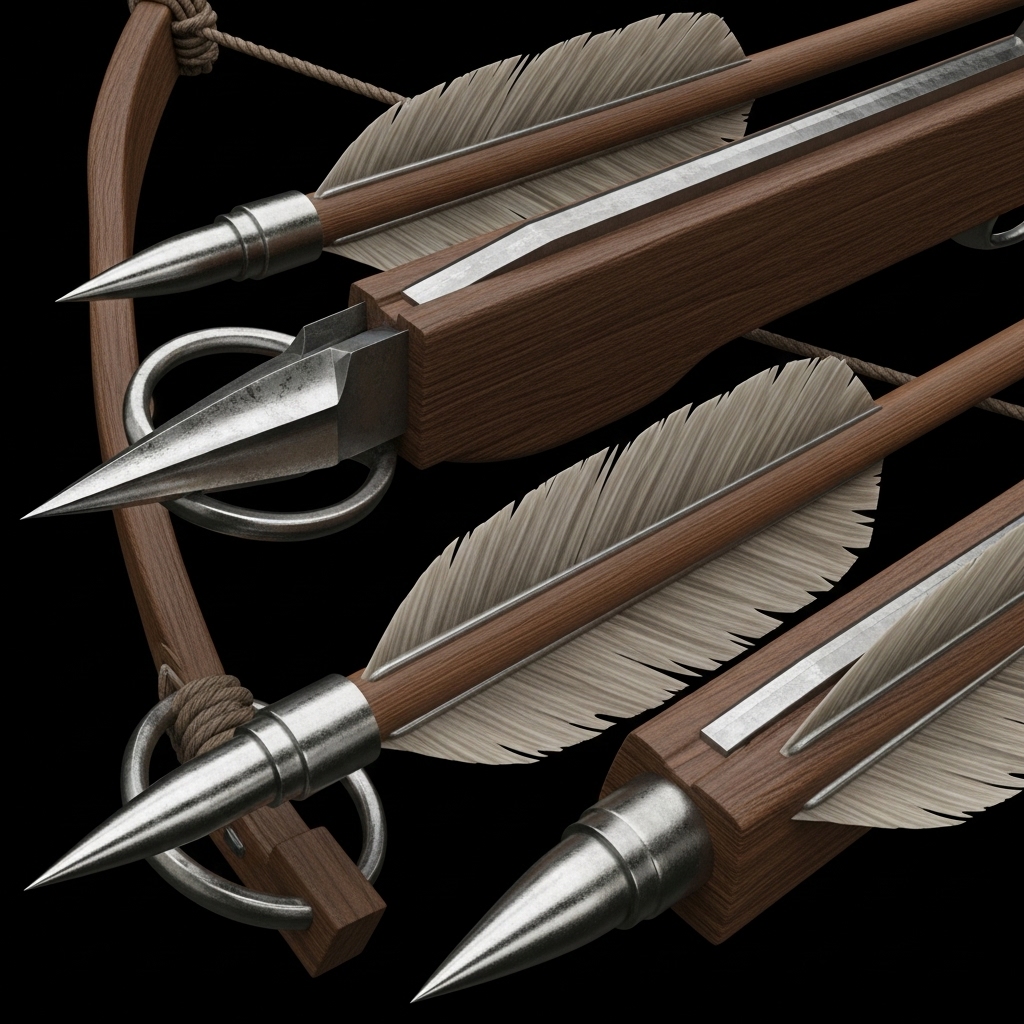Crossbow Bolts

Weight: 1.5 lb. (20 bolts)
Cost: 1 GP (20 bolts)
Category: Ammunition
Function: Light and heavy crossbow ammunition
Description
Short, thick projectiles designed specifically for crossbow use. These sturdy bolts feature heavy construction and broad fletching for stability when fired from the mechanical tension of crossbow mechanisms, providing devastating impact force.
Usage Instructions
Loading: Place bolt in crossbow groove with fletching toward the stock.
Cocking: Draw crossbow string back to full tension using appropriate mechanism.
Firing: Pull trigger to release string and propel bolt toward target.
Combat Applications
- Siege Warfare: Powerful projectiles for defensive positions
- Assassination: High-impact silent elimination
- Armor Penetration: Effective against medium armor
- Guard Duty: Reliable defensive ammunition
- Hunting: Taking large game with crossbows
Bolt Construction
Shaft: Thick wooden or metal body for durability Point: Heavy metal tip designed for penetration Fletching: Broad vanes for stability at high velocity Nock: Reinforced end to withstand crossbow string impact
Quality Variations
Standard Bolts (1 GP/20): Basic construction, iron points Military Bolts (3 GP/20): Reinforced shafts, steel points Siege Bolts (5 GP/20): Heavy construction, armor-piercing Masterwork Bolts (15 GP/20): Perfect balance, superior penetration
Tactical Considerations
Advantages:
- High penetration power
- Consistent accuracy from crossbow mechanics
- Effective against armored targets
- Reliable in adverse weather
- Can be mass-produced for armies
Limitations:
- Heavier than arrows
- Slower reload time
- More expensive than arrows
- Requires crossbow for use
- Difficult to recover intact
Specialized Bolt Types
Bodkin Bolts: Narrow points for maximum armor penetration Broadhead Bolts: Wide cutting heads for hunting applications Incendiary Bolts: Fire-starting tips for siege warfare Grappling Bolts: Attached lines for climbing or retrieval Explosive Bolts: Alchemical charges for special operations
Crossbow Compatibility
Light Crossbows: Standard bolts work with all light crossbow types Heavy Crossbows: Require heavier bolts for optimal performance Hand Crossbows: May use shorter, lighter bolt variants Repeating Crossbows: Specialized bolts for multi-shot mechanisms
Storage and Transport
Bolt Cases: Protective containers for organized storage Quivers: Modified arrow quivers adapted for bolt storage Belt Loops: Individual bolt carriers for quick access Bulk Containers: Large storage for military supplies
Maintenance Requirements
Point Maintenance: Keep tips sharp for maximum penetration Shaft Inspection: Check for stress fractures from crossbow impact Fletching Care: Maintain vane integrity for flight stability String Groove: Ensure nock fits crossbow string properly
Recovery Considerations
Impact Damage: Bolts often break on impact due to high velocity Penetration Depth: May be difficult to extract from targets Bent Shafts: High-stress impacts frequently bend bolt shafts Lost Bolts: Missed shots may bury deeply in terrain
Alternative Uses
- Improvised Weapons: Can serve as short spears or daggers
- Construction Tools: Heavy shafts useful for leverage
- Trap Components: Mechanical trap projectiles
- Measuring Tools: Consistent length for distance measurement
- Crafting Materials: Points and shafts for other projects